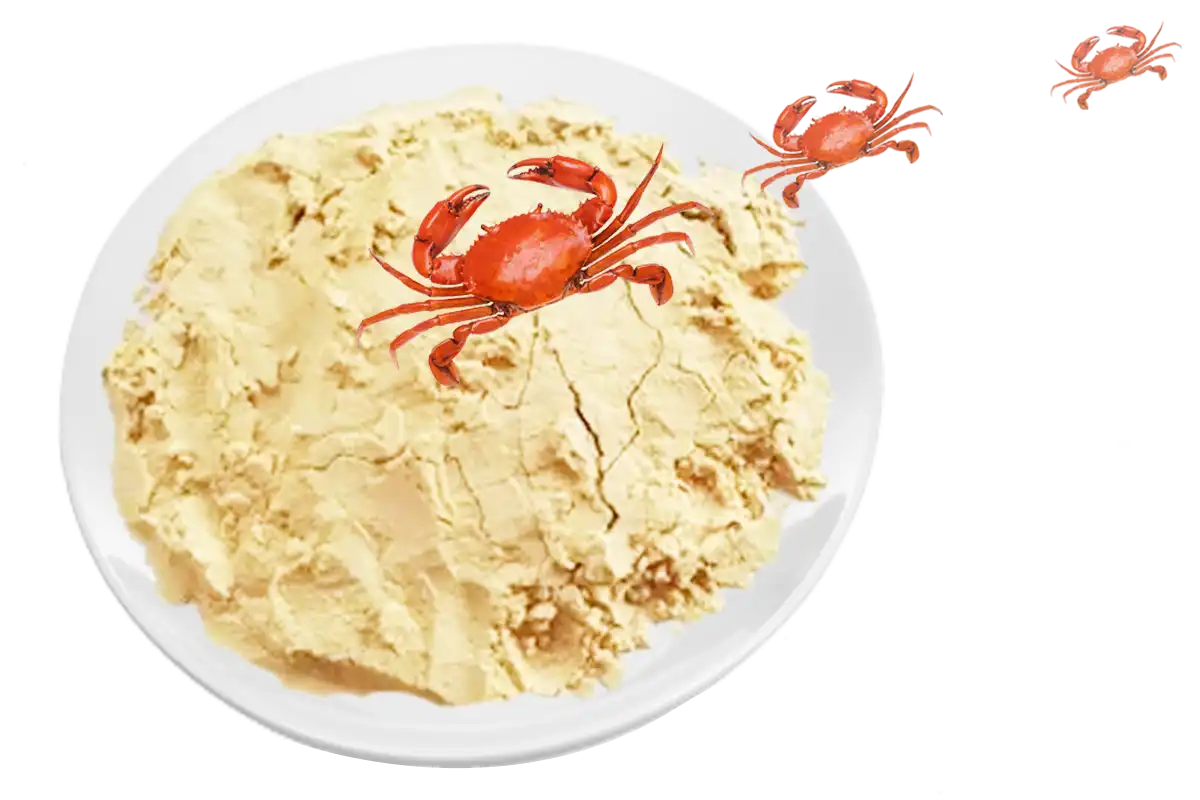3. What are the benefits and functions of chitosan in animal fodder?
Chitosan is derived from crab shells and has a variety of benefits and functions when used as Feed additives in animal nutrition. Here are the main benefits:
Benefits of chitosan in animal fodder
- 1. Fodder with chitosan added promotes the growth of animals:
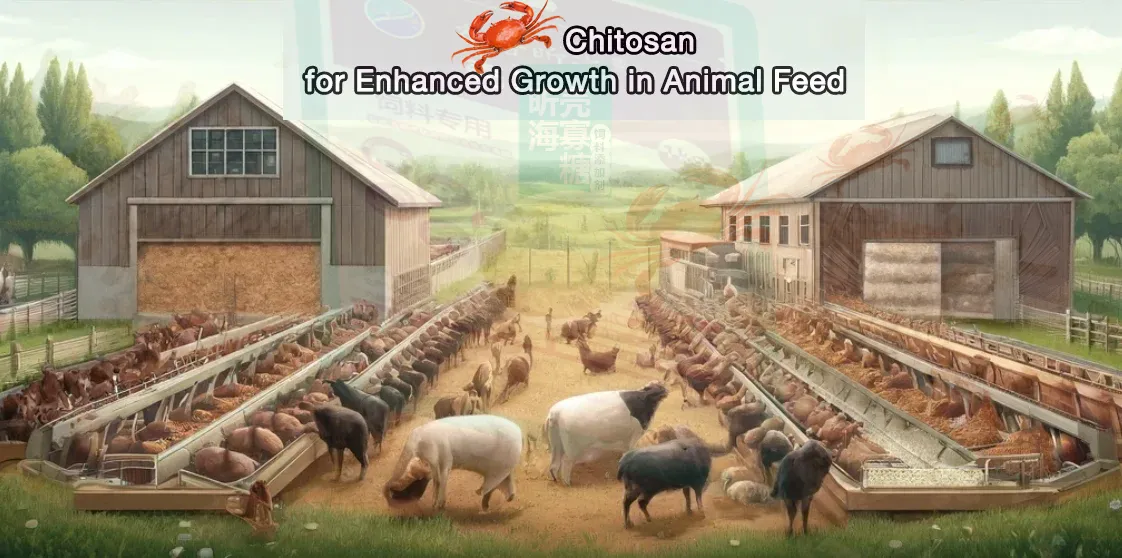
- Increase growth rate:
When chitosan is added to animal fodder, it helps to increase the growth rate of the animal.
This is due to a combination of factors related to chitosan properties.
- Reduces antimicrobial effects:
Chitosan has natural antimicrobial properties that help reduce harmful bacteria in the animal's digestive system.
This can lead to a healthier intestinal environment, which reduces the need for antibiotics.
- Enhances nutrient absorption:
Chitosan can improve the absorption of FODDER nutrients in the digestive tract of animals.
This is due to its ability to form a thin film along the intestinal wall, which aids in nutrient absorption.
- Potential prebiotic effects:
Some studies have shown that chitosan has prebiotic properties that promote the growth of beneficial gut bacteria.
A healthier gut microbiome can help improve overall health and growth.
- Immune System Support:
The immunomodulatory properties of chitosan help to boost the immune system in animals.
A stronger immune system can indirectly support better growth by reducing the amount of energy it takes to fight off infections.
- Binding properties with fats:
In some cases, chitosan helps to reduce fat absorption, which is beneficial for managing the animal's body composition.
- 2. Improved gut health after feeding animals with chitosan:
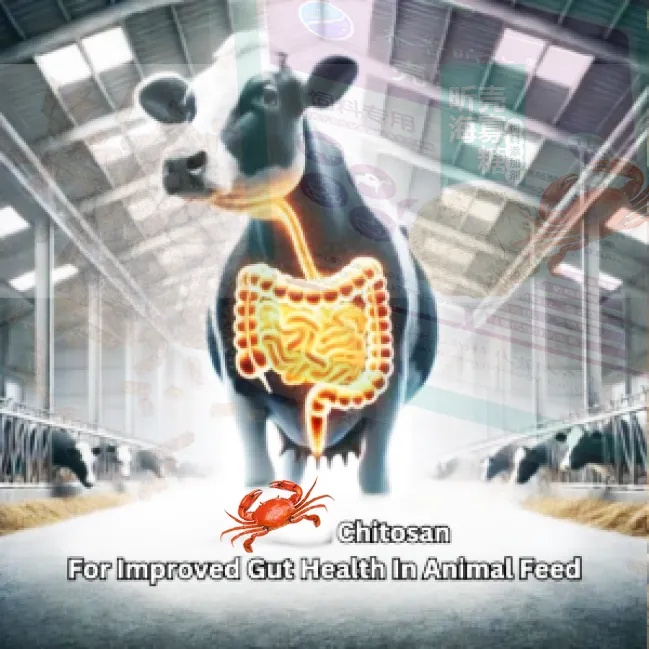
- promotes healthy gut microbiota balance:
Chitosan can act as a prebiotic to support the growth of beneficial gut bacteria.
It can help create an environment that is conducive to beneficial microbes rather than harmful ones.
- Better digestion:
Chitosan can improve the efficiency of nutrient absorption in the digestive tract.
It helps break down certain compounds, making them easier to digest.
- Antimicrobial properties:
Chitosan's natural antimicrobial effects help control harmful bacteria in the gut without destroying the beneficial flora.
- Improves intestinal barrier function:
Chitosan helps to strengthen the intestinal lining and reduces the risk of "leaky gut" and related health problems.
- Reduces inflammation:
The anti-inflammatory properties of chitosan help maintain a healthier intestinal environment.
- Boosts immune function:
Chitosan supports a healthier gut microbiome that helps boost the overall immune response.
- Potential Reduction in Digestive Disorders:
By promoting a balanced intestinal environment, chitosan helps reduce the incidence of certain digestive problems.
- 3. Enhanced immune response in chitosan animals:
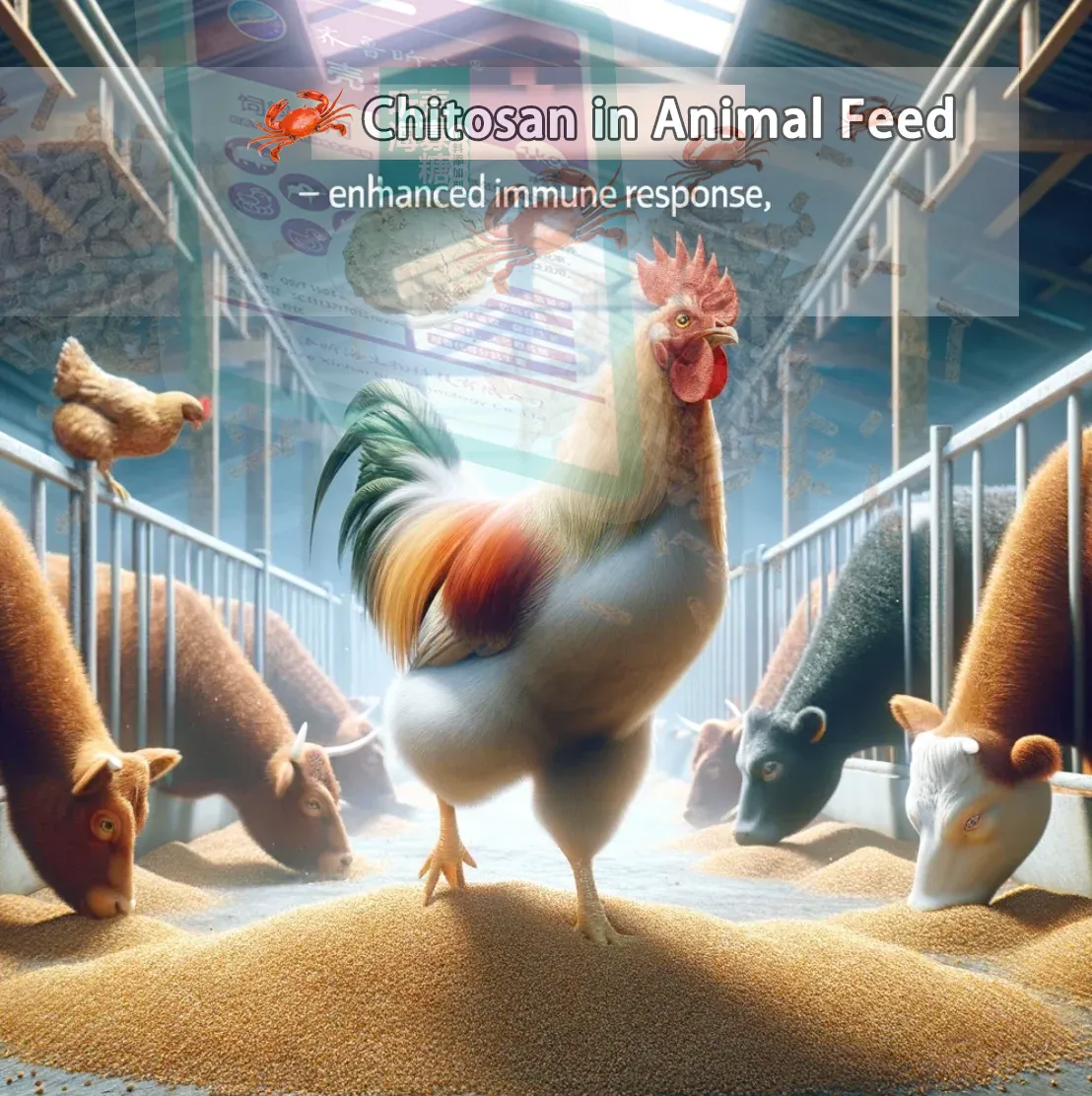
- strengthens the immune system:
Chitosan can stimulate the production and activity of immune cells.
It can enhance the innate and adaptive immune response in animals.
- Increased disease resistance:
Chitosan can help animals fight infections and diseases more effectively by boosting the immune system.
- Adjuvant properties:
Chitosan can be used as an adjuvant to enhance the effectiveness of vaccines when used in animal health applications.
- Anti-inflammatory effects:
The anti-inflammatory properties of chitosan help regulate the immune response, thereby reducing harmful inflammation.
- Gut Health Improvement:
Chitosan indirectly supports overall immune function by promoting a healthier gut microbiome, as a large portion of the immune system is located in the gut.
- Antioxidant activity:
The antioxidant properties of chitosan help protect immune cells from oxidative stress and maintain their function.
- Wound Healing Support:
In topical applications, chitosan can help with wound healing, which is part of the immune response.
- 4. Reduced cholesterol levels in chitosan animals:
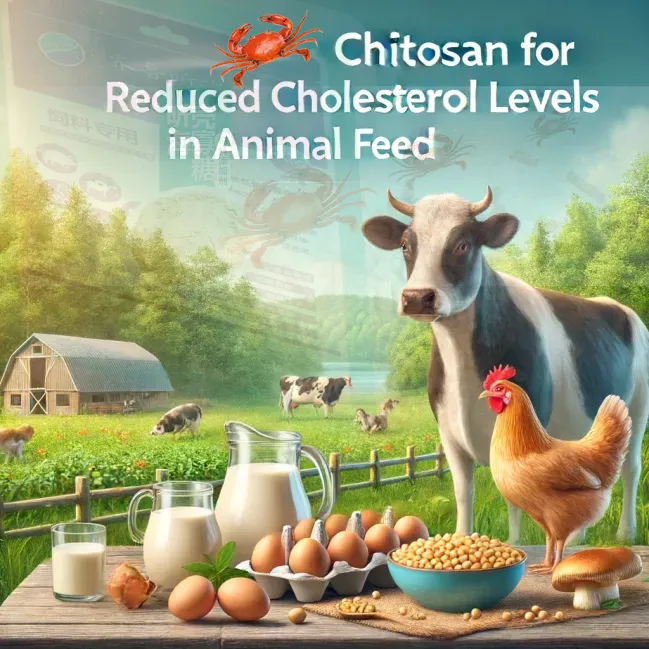
- cholesterol-binding properties:
Chitosan can bind to dietary fats and cholesterol in the digestive tract, reducing their absorption.
- The potential of healthier animal products:
By lowering cholesterol levels in animals, healthier meat, milk, or eggs can be produced for human consumption.
- Lipid metabolism:
Some studies have shown that chitosan affects lipid metabolism in animals, leading to lower overall cholesterol levels.
- 5. Detoxification properties of chitosan in animals:
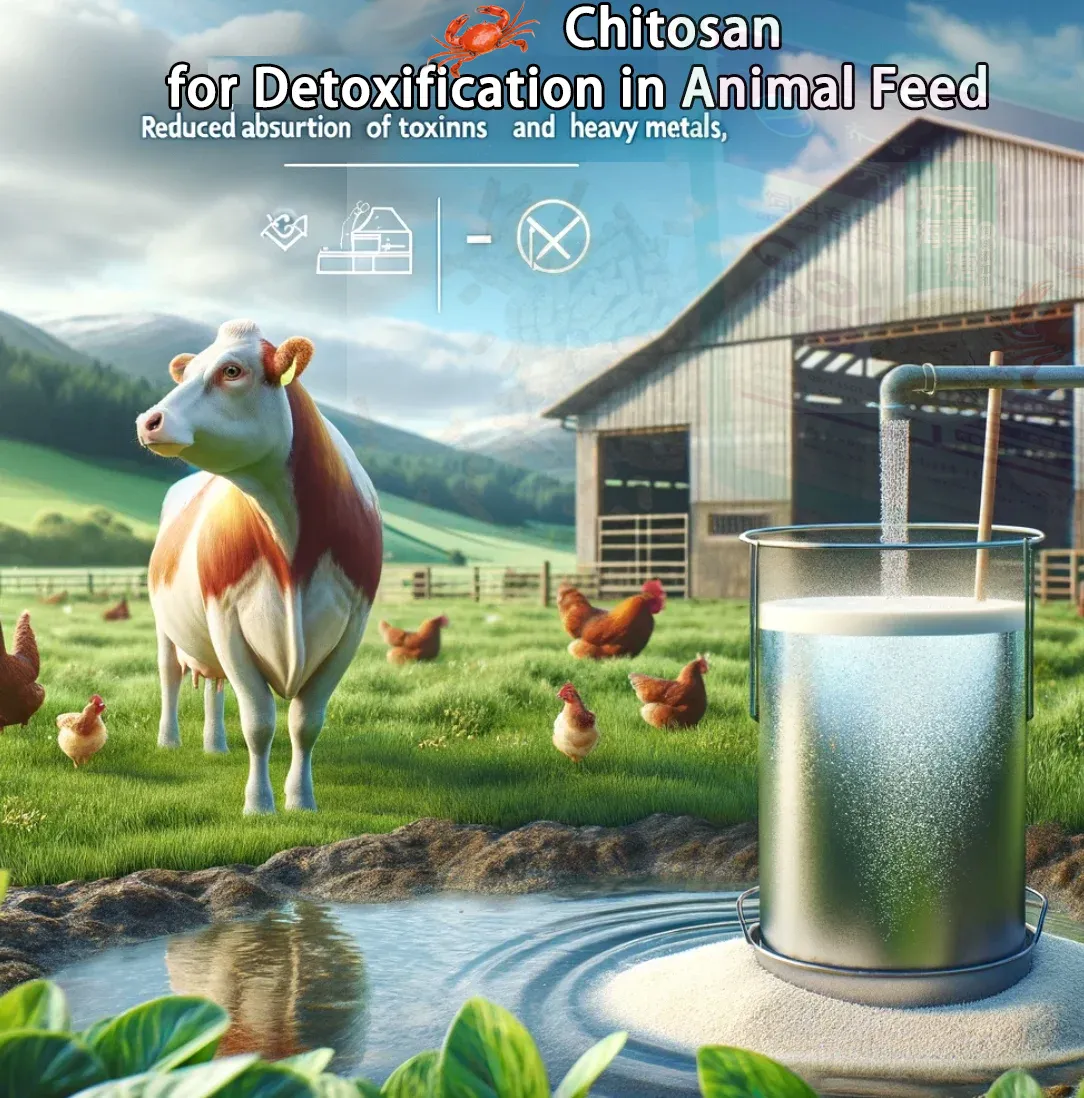
- binds toxins and heavy metals:
Chitosan binds to various toxins and heavy metals in the digestive tract.
This binding reduces the absorption of these harmful substances into the animal's body.
- Safer animal products:
By reducing the absorption of toxins, chitosan theoretically contributes to the production of safer animal products for human consumption.
- Chelating properties:
Chitosan acts as a chelating agent, forming complexes with metal ions, which helps in removing them from the body.
- Reduction of environmental pollutants:
In animals exposed to environmental pollutants, chitosan supplementation can help mitigate the effects of these contaminants.
- Liver Support:
By reducing the toxic load on the liver, chitosan can indirectly support liver health and function in animals.
- Variability of effectiveness:
The detoxification efficacy of chitosan varies depending on factors such as the type of toxin, the species of animal, and the dose.
Function of chitosan in animal fodder
- Growth promoters: Chitosan acts as a biostimulant to promote animal growth by increasing fodder utilization.
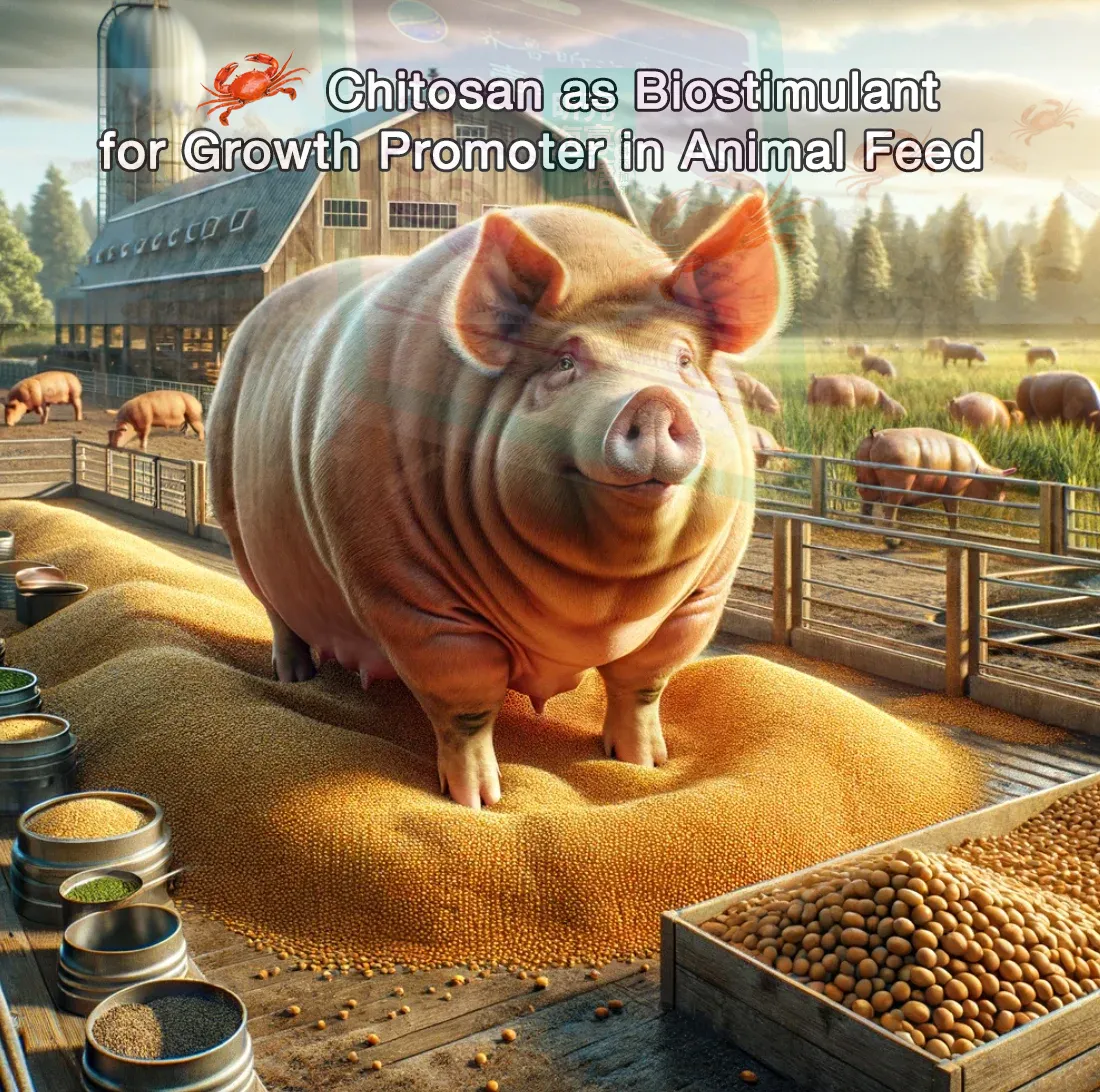
- Antimicrobial agents: Chitosan has antimicrobial properties that help control pathogenic bacteria and fungi within the digestive system of animals.
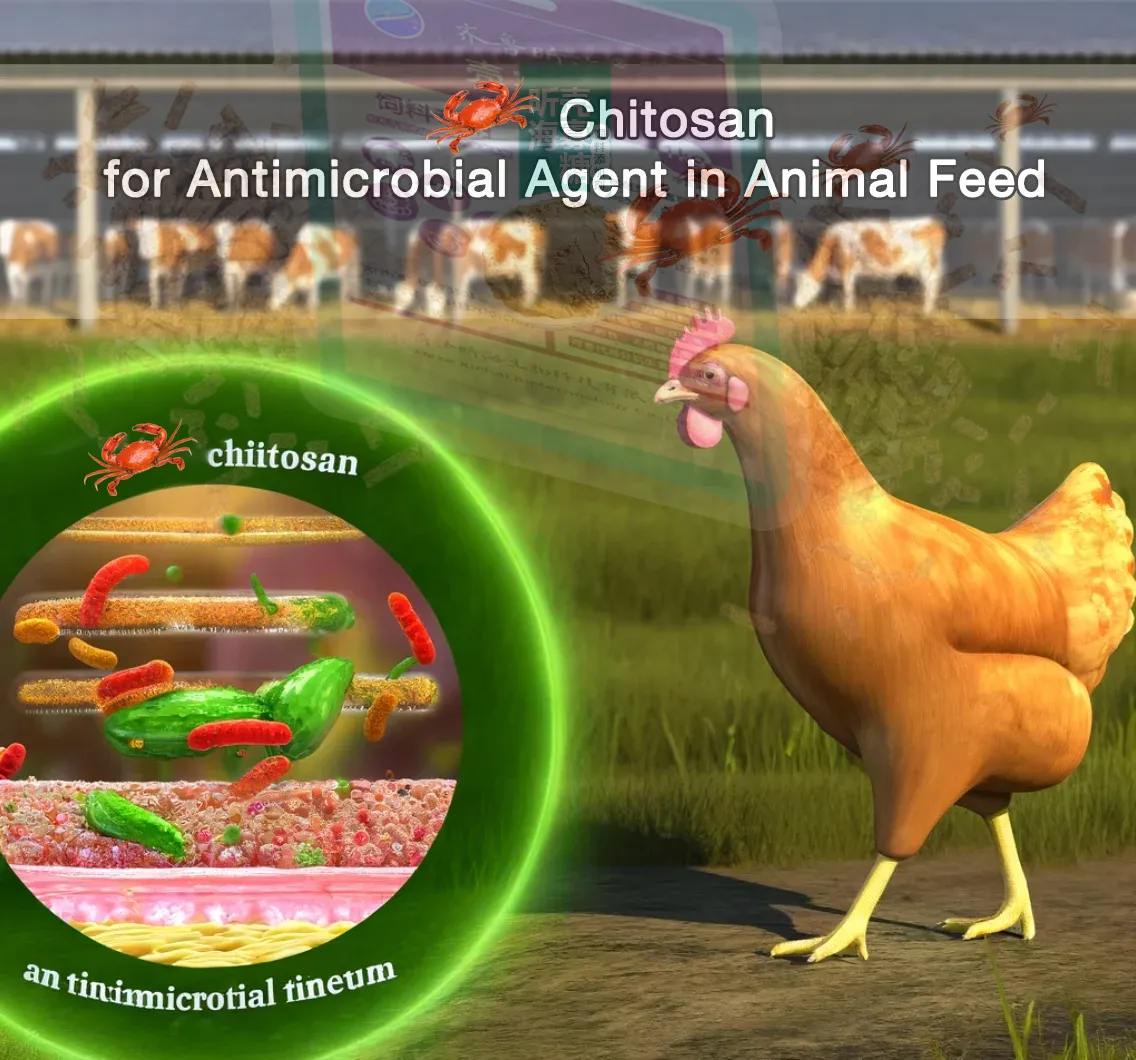
- Immunomodulators: Chitosan regulates the immune system by enhancing the activity of immune cells and the production of beneficial cytokines.
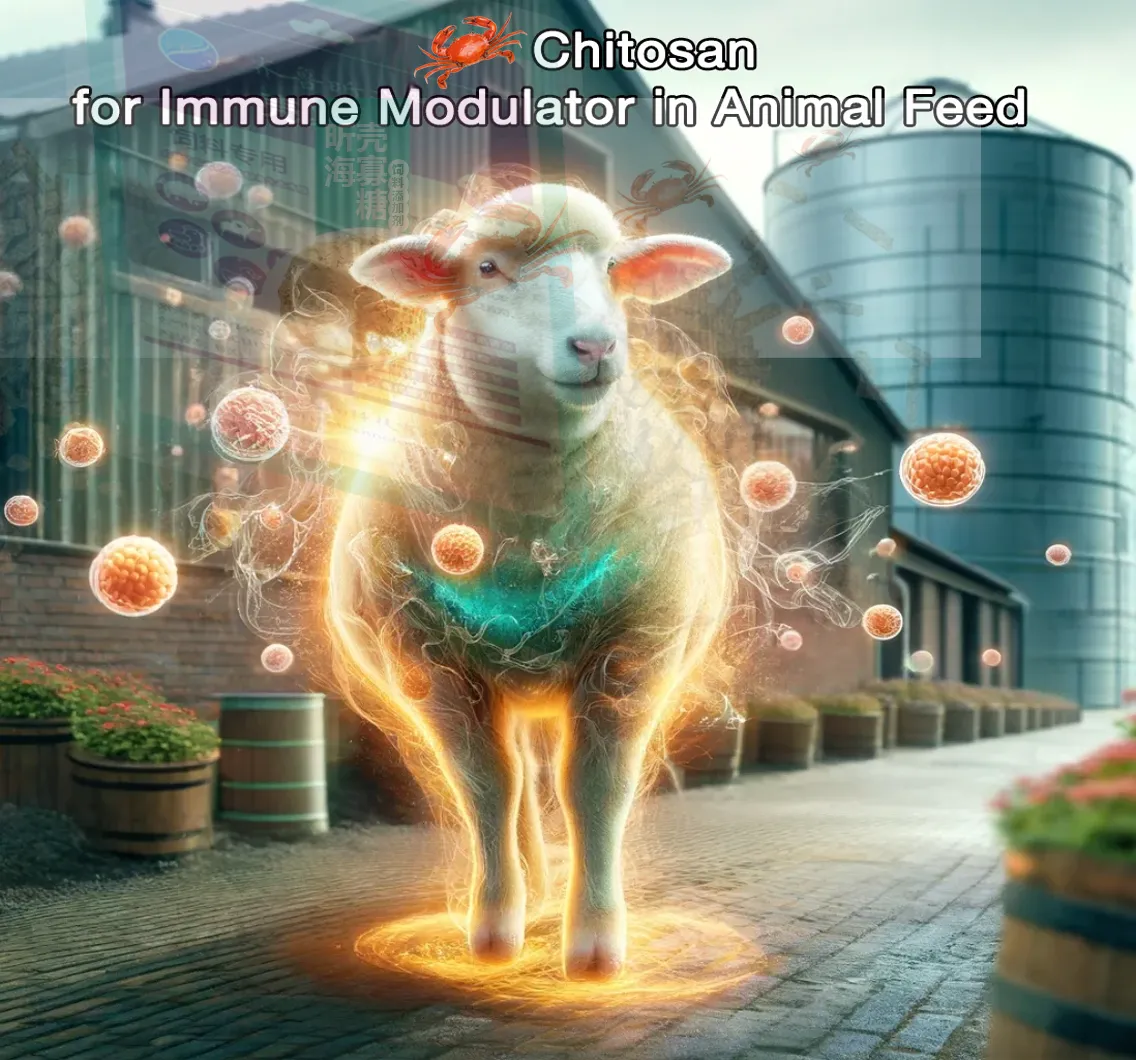
- Toxin adsorbents: Chitosan has the effect of acting as a binding agent for toxins and heavy metals, reducing their bioavailability in the animal digestive system.
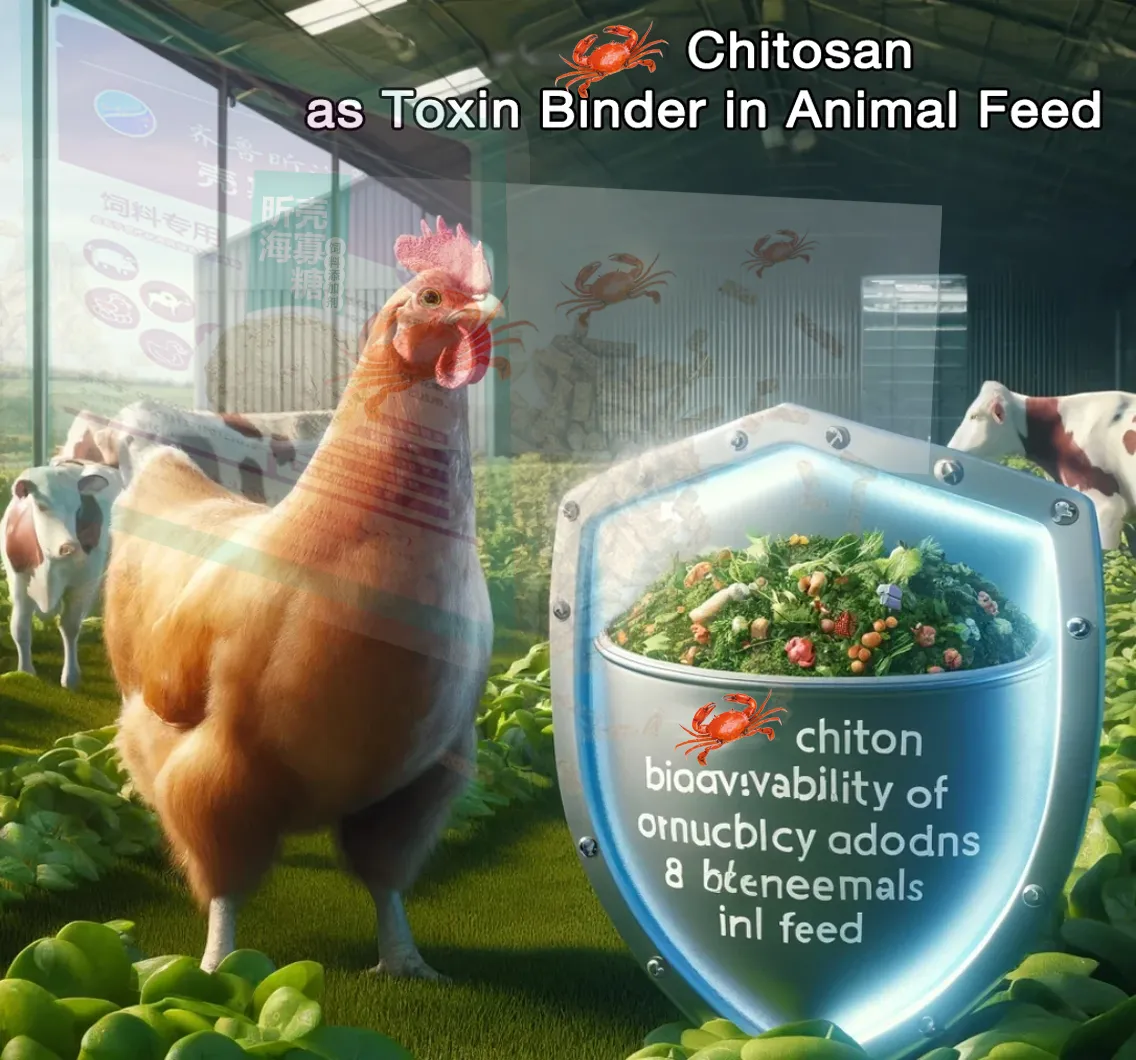
- Lowers cholesterol: Chitosan has a biochemical effect that reduces the synthesis or absorption of cholesterol in animals.
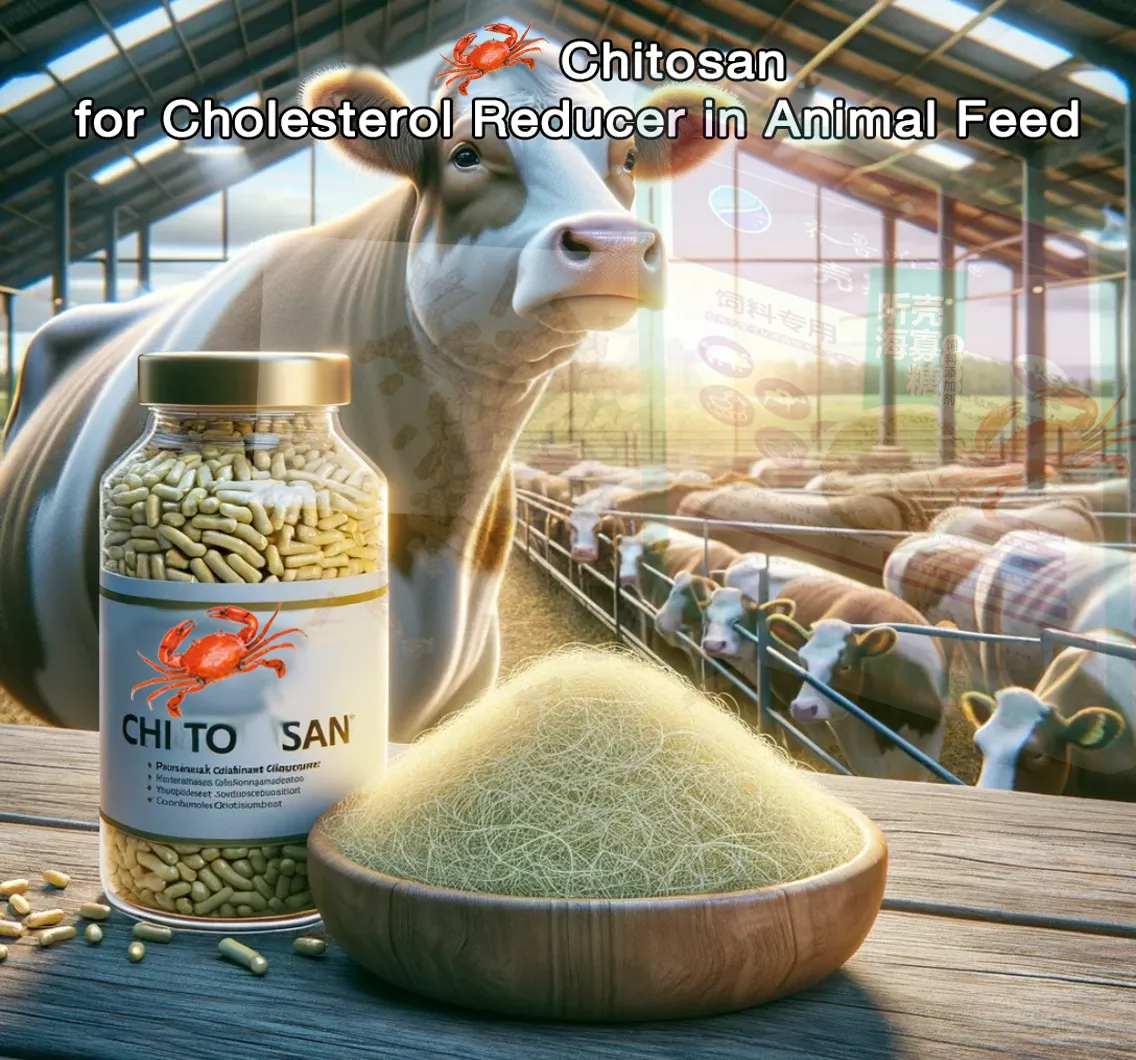
The benefits and features of these classifications highlight the multifaceted role chitosan can play in animal nutrition, contributing to healthier livestock and better quality animal products.
4. What types of animals benefit from chitosan as a feed additives?
Chitosan can be used as a feed additives for a variety of animals in agriculture and aquaculture. Here are some of the main types of animals that can benefit from including chitosan in their diet:
1. Benefits of chitosan for poultry (chickens, turkeys, and other poultry):
- Growth Promotion:
Chitosan helps to increase fodder efficiency and growth rate in poultry.
This results in higher meat yields and overall productivity.
- Strengthens the immune system:
Chitosan can boost the immune system of poultry and help them fight diseases and infections more effectively.
This reduces the need for antibiotics and improves the overall health of the flock.
- Gut health improvement:
Chitosan can promote a healthy balance of the gut microbiota in poultry.
This can lead to better digestion and nutrient absorption.
- Antimicrobial properties:
Chitosan's natural antimicrobial effects help control harmful bacteria in the gut of poultry.
- Egg Quality:
Some studies have shown that chitosan supplementation improves egg quality in laying hens.
- Reduce stress:
The antioxidant properties of chitosan can help poultry better cope with environmental stressors.
- Potential prebiotic effects:
Chitosan acts as a prebiotic and promotes the growth of beneficial gut bacteria in poultry.
2. Benefits of chitosan for pigs:
- Increase growth rate:
In the absence of antibiotics, chitosan supplementation can help increase the overall growth rate of pigs.
This leads to faster weight gain and shorter time to market.
- Improve fodder efficiency:
Chitosan can help pigs utilize fodder more efficiently.
This will better convert fodder to body weight, which will reduce the overall fodder cost.
- Boosts immune function:
Chitosan can boost the immune system of pigs, making them more resistant to disease.
This reduces the need for antibiotics and improves overall herd health.
- Reduces the fat content in pork:
Some studies have shown that chitosan supplementation can help reduce fat deposits in pigs.
This results in a leaner pork product, which is desirable for consumers.
- Gut health improvement:
Chitosan can promote a healthier balance of the gut microbiota in pigs.
This can lead to better digestion and nutrient absorption.
- Antimicrobial properties:
Chitosan's natural antimicrobial effects help control harmful bacteria in the pig's digestive system.
- Potential stress reduction:
The antioxidant properties of chitosan can help pigs better cope with environmental stress.
3. Benefits of chitosan for ruminants:
- Improves intestinal health:
Chitosan helps maintain a healthy balance of microbes in the rumen and gut.
This can lead to a more efficient digestion and fermentation process.
- Enhanced nutrient absorption:
Chitosan can improve the absorption of nutrients in fodder by promoting a healthier gut environment.
This results in better fodder efficiency and animal performance.
- Boosts immunity:
Chitosan can help boost the immune system of ruminants.
This leads to increased resistance to various diseases and infections.
- Potential methane reductions:
Some studies have shown that chitosan helps reduce the production of methane in ruminants, which is good for the environment.
- Improved rumen function:
Chitosan helps optimize rumen pH and fermentation patterns.
This results in better overall digestion efficiency.
- Parasite control:
Chitosan has shown some potential in helping to control internal parasites in ruminants.
- Antioxidant effect:
The antioxidant properties of chitosan help protect ruminants from oxidative stress.
4. Benefits of chitosan in aquaculture:
- Improve water quality:
Chitosan can bind to toxins and impurities in water, helping to maintain a cleaner aquaculture environment.
This can improve the overall health of fish and shrimp.
- Enhance disease resistance:
Chitosan has been shown to boost the immune system of aquatic species.
This can help fish and shrimp to better resist various diseases that are common in aquaculture environments.
- Antimicrobial properties:
Chitosan's natural antimicrobial effects can help control harmful bacteria in aquaculture systems.
This will reduce the need for antibiotics in fish and shrimp farming.
- Growth Promotion:
Some studies have shown that chitosan supplementation can increase the growth rate of certain aquatic species.
- Wound healing:
Properties of chitosan can help fish heal wounds faster, which is especially important in high-density aquaculture environments.
- Biofilm reduction:
Chitosan helps to reduce the formation of biofilm in aquaculture tanks and equipment, thereby improving hygiene.
- Feed additives:
When used as feed additives, chitosan can improve nutrient absorption and fodder efficiency in aquatic species.
- Environmental sustainability:
By improving water quality and reducing the need for chemical treatments, chitosan can contribute to more sustainable aquaculture practices.
5. Benefits of chitosan for pets (dogs and cats):
- Improves digestive health:
Chitosan helps promote a healthy balance of gut bacteria in pets.
This can lead to better digestion and nutrient absorption.
- Lowers cholesterol levels:
Some studies have shown that chitosan can help lower cholesterol levels in animals, which can be beneficial for overweight pets or pets with certain health conditions.
- Boosts immunity:
Chitosan has immune-boosting properties that can help boost pets' natural defenses against disease.
- Weight management:
Chitosan's ability to bind to fat helps control the weight of overweight pets, but this should be done under the supervision of a veterinarian.
- Dental health:
Some pet dental products contain chitosan because of its antimicrobial properties, which can help reduce plaque and tartar buildup.
- Wound healing:
Topical applications of chitosan have shown promise for accelerating wound healing in animals.
- Potential anti-inflammatory effects:
The anti-inflammatory properties of chitosan are beneficial for pets suffering from certain inflammations.
Chitosan is particularly valuable in these applications due to its natural origin and biodegradability, making it a safe and environmentally friendly choice for animal feed additives.
5. What are the forms of chitosan used in animal fodder?
Chitosan can be incorporated into animal fodder in a variety of forms to suit different types of diets and feeding styles.
The proportion of chitosan added to animal fodder can vary greatly depending on the specific form used, the type of animal, the expected health benefits, and existing regulatory guidelines.
Below are the common forms of use of Chito-oligosaccharides, as well as some general guidelines on the addition ratios of different forms of chitosan and their areas of application, as well as which type of chitosan is suitable for each form of segmentation:
1. Powder: Chitosan powder is the most common form and mixes easily with other fodder ingredients. It is suitable for both solid and liquid feed formulations.
- Addition rate: typically 0.1% to 2% of total fodder weight.
- Suitable chitosan type: Acid-soluble chitosan with viscosities ranging from 20-100cps or 100-500cps is usually used in powder form. Chito-oligosaccharides are also suitable for specific applications that require rapid absorption.
application:
- Growth promotion and immune enhancement in poultry, pigs, and ruminants.
- Improves intestinal health and toxin binding.
- Incorporation into premix or complete feed.
2. Granules: Chitosan can be granulated with other fodder ingredients. Pellets are particularly popular in livestock and aquaculture fodder because of their ease of handling and distribution.
- Addition ratio: Generally around 0.5% to 1.5%, mixed with other fodder ingredients before granulation.
- Suitable chitosan type: Acid-soluble chitosan with viscosities in the range of 100-500cps or 500-1000cps is commonly used for granulation. Chitosan hydrochloride is also suitable for specific applications.
application:
- Livestock and aquaculture fodder that require homogeneous mixing and controlled release of active ingredients.
- Increases fodder efficiency and promotes growth.
- Increased disease resistance.
3. Flakes: Similar to powders, chitosan flakes can be mixed into fodder. This form is more popular because it is easy to mix in certain types of animal diets.
- Addition ratio: Similar to powder, about 0.1% to 2%.
- Suitable chitosan type: Depending on the desired application, acid-soluble chitosan with different viscosity ranges can be used in sheet form.
application:
- Similar to the powder form, it is suitable for incorporation into feeds where stability and ease of mixing are important.
- Preferred in some Fodder production processes.
4. Liquid Solution: Chitosan can be dissolved in water to make liquid fodder supplements. This form facilitates precise dose control and is particularly useful in aquaculture or young animals.
- Proportion added: Can vary greatly and is typically used at concentrations of 1% to 5% in the final fodder solution.
- Suitable chitosan type: Acid-soluble chitosan with viscosities ranging from 20-100cps or 100-500cps is commonly used in liquid solutions. Chitosan hydrochloride or carboxymethyl chitosan are also suitable.
application:
- Aquaculture and young animal fodder with liquid feeding system.
5. Coating form: Chitosan can be coated on Fodder particles to control the release of active compounds or to protect the integrity of chitosan in the digestive tract.
- Addition rate: typically around 0.5% to 1%, depending on coating efficiency and target release profile.
- Suitable chitosan type: Acid-soluble chitosan with viscosities in the range of 100-500cps or 500-1000cps is commonly used in coating applications. Chitosan oligosaccharides are also suitable.
application::
- Controlled-release formulations that deliver targeted health benefits to the livestock and aquaculture industries.
- Protects the active ingredient during FODDER processing and storage.
6. Gel: In some applications, chitosan can be used in gel form, especially for special dietary needs or veterinary health care products.
- Addition rate: Less common, but usually used at higher concentrations, such as 1% to 10% in a specific target application.
- Suitable chitosan type: Acid-soluble chitosan with viscosities ranging from 100-500cps or 500-1000cps is commonly used in gel formulations. Chitosan hydrochloride is also suitable.
application:
- Veterinary health supplements.
- Specialized dietary supplements for specific animal health needs.
- Controlled-release formula for long-lasting results.
6. What is the summary of the Chito-oligosaccharides used in the animal fodder?
Chito-oligosaccharides are derived from crab shells and are the cornerstone of animal nutrition with a comprehensive range of benefits.
As a natural enhancer of gut health, it promotes the proliferation of beneficial gut bacteria while inhibiting the growth of harmful pathogens, thereby promoting optimal nutrient absorption and boosting the animal's immune defenses.
Its versatility is reflected in its skillful toxin binding ability, which effectively neutralizes toxins and heavy metals in the digestive tract and thus protects animal health.
In addition, the intrinsic antimicrobial properties of Chito-oligosaccharides help maintain a balanced microbial ecosystem in the gut, further enhancing the overall health of the animal.
The efficacy of Chito-oligosaccharides is further amplified by the various forms of chitosan, which are tailored to different applications in animal fodder.
Whether in powder, granule, liquid solution or gel form, Chito-oligosaccharides can be flexibly incorporated into the fodder for precise dose control and targeted beneficial effects.
Each form offers unique benefits, from improving fodder efficiency and promoting growth to enhancing disease resistance and immune modulation.
Through its diverse forms and multifaceted benefits, Chito-oligosaccharides are an indispensable part of promoting animal health and productivity in the livestock and aquaculture industries.



